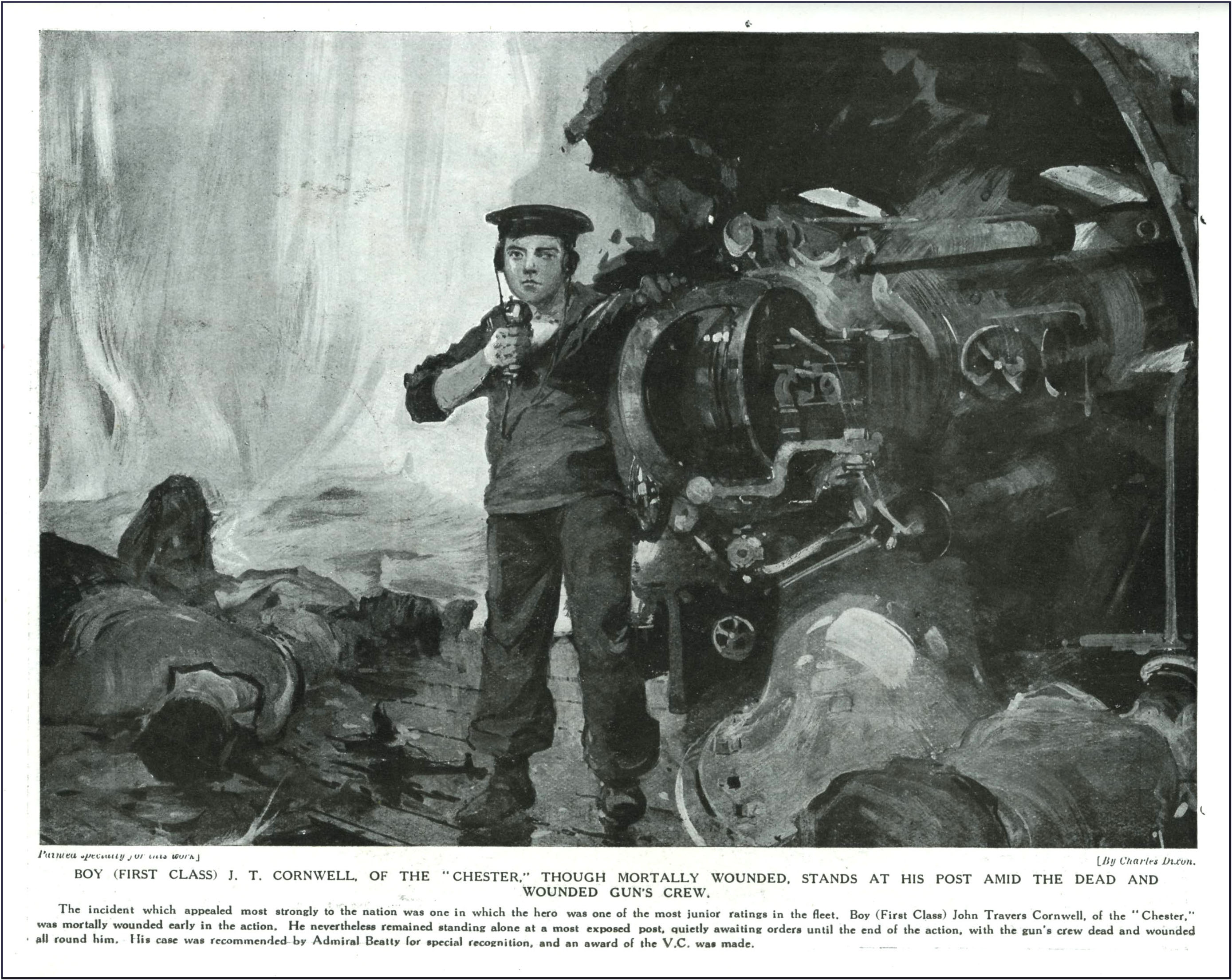His was the ultimate sacrifice. At 16 years old, Jack Cornwell became one of the youngest recipients of the Victoria Cross, the highest decoration for valour first instituted by Queen Victoria in 1856. Cornwell was not the youngest to receive the VC but he is probably the most famous.
John Travers Cornwell was born at Leyton in Essex on January 8th 1900, the son of Eli and Lily. At age ten, he spent some time in the workhouse and away from his parents who were seriously short of money. Jack joined the boy scouts and was praised by his scout master, who wrote: “Nothing was too hard for him… he would attempt any task.”
Young Jack had always had the desire to join the Royal Navy. His parents, however, would not entertain the idea. At the end of 1913, he left school and became a delivery van boy for Brooke Bond Tea, and later worked for Whitbread’s as a dray boy at the depot in Manor Park in London.

When World War I started, his parents were persuaded that he should join the navy and even though he was underage, he managed to join. On July 27th 1915, at Devonport in Plymouth, fifteen year old Jack became Boy Second Class J.T. Cornwell J/42653 and did his training at Keyham Naval Barracks in Plymouth, later being selected for training as a Gun Layer or Sight Setter. During this time he was guided by a London Police Sergeant and passed out as Boy Seaman, First Class. He regularly attended church and was confirmed by the Padre at Plymouth. When he went home on leave he would proudly show the flashes of rank on his sleeve. His mother remarked that his earlier experiences with the scout movement had adapted him well for naval training.
Easter Monday 1916 saw Jack on the platform at King’s Cross Station saying farewell to his family. His orders had come through by telegram commanding him to join fleet units at Rosyth in Scotland. His mother was naturally worried and fussed over him, but Jack told her that this is what he had signed up for and it was his duty to go.
Arriving at Rosyth he was astonished to see huge battleships he had only ever seen pictures of. He was soon a crew member of HMS Chester of the third Cruiser Squadroom.

At 17:40 hours on May 31st in the foggy North Sea off Jutland near to Denmark, HMS Chester was on station screening ahead of the field. In the distance, the sound of gunfire could be heard. The ship’s captain, Robert N. Lawson, having orders to rendezvous with Admiral Beatty’s Battle Group, gave the order for full speed ahead. The crew were stirred and bugles sounded action stations for them to go to their positions.
Jack stood at his post listening through headphones for orders from the Gunnery Officer in the control tower above. As the ‘Chester’ sliced through the sea, four German cruisers could be seen ahead. ‘Chester’ turned to port to line up her broadside guns and opened fire but was outnumbered and hit seventeen times.
Four of the German hits on the ‘Chester’ were around the gun turret where Jack was, causing many casualties including Jack, hit by shrapnel in his chest. He stayed at his post awaiting more orders, not realising he was mortally wounded. The ‘Chester’ disengaged activities and was ordered back to Immingham Docks on the Humber. Medical help was sent on board, Jack was taken below, and later transferred to a tug boat.
Taken to Grimsby General Hospital he was cared for by the Admiralty Surgeon. The nurses asked Jack how the battle went and he replied, “Oh, we carried on alright.” Sadly, he lived only another twenty four hours and only managed to utter, “I know mother is coming, give her my love.”
Jack died on June 2nd 1916. Sadly, his mother did not arrive in time before he died. Admiral Sir David Beatty singled Jack out above all others for his devotion to duty and said: “ Boy (1st class) John Travers Cornwell of the Chester was mortally wounded early in the action. He nevertheless remained standing alone at a most exposed post till the end of the action, with the gun’s crew dead and wounded all around him. He was under sixteen and a half years.”

Jack was buried at Scartho Road Cemetery in Grimsby in an ordinary war grave but after three months the full story of his bravery became known and the Admiralty recommended him for the highest honour. Documents were drawn up for the transfer of his body to London’s Manor Park Cemetery with full military honours. King George V endorsed the recommendation that Jack should receive the Victoria Cross posthumously.
His final resting place at Manor Park Cemetery can be easily spotted as one goes through the gates. The monument was erected by the schoolchildren of East Ham, it has pride of place there and many people speak of it with great pride and respect.
For more fascinating stories from World War I check out the latest issue of All About History or subscribe now and save 25%!
